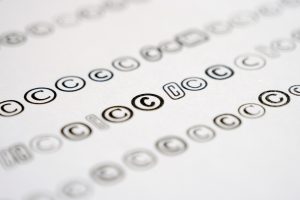COPYRIGHT PAYMENTS FOR SOFTWARE DEVELOPERS
Software developers are getting paid increasingly via copyright payments. These copyright payments are advantageous for both independent software developers and employee-developers. However, it is important to not pay excessive copyright royalties. Belgian tax authorities are carrying out more and more tax controls, resulting in repayment of excessive tax advantages. Therefore, a good framework (contract, advice and ruling if necessary) is very important.

How much tax do you pay on copyright fees?
On remunerations for copyright, you pay withholding tax at a rate of 15% (up to a limit of EUR 62,550 for the year 2021). However, Belgian law allows you to deduct flat-rate costs, so that the actual tax rate for copyright payments is lower.
A schematic overview of the threshold amounts for copyright fees for the income year 2021 (these thresholds are indexed each year):
| Copyright
|
Flat-rate costs | Taxable
|
Withholding tax (15%) |
| €0 – €16.680
|
50% (of €8.340)
|
€8.340
|
€1.251 (or 7,5% for the full amount)
|
| €16.680 – €33.360 | 25% (of €4.170 )
|
€12.510
|
€1.876,5 (or 11,25% for the full amount)
|
| €33.360 – €62.550
|
0% (of €0)
|
€29.190
|
€4.378,5 (or 15% for the full amount)
|
| > €62.550
|
No withholding tax but progressive income tax between 25% and 50% |
In other words, a person who receives €62.550 in copyright fees in the income year 2021 will pay 12% withholding tax or €7.506.
Self-employed software developers and copyright payments
A self-employed software developer can receive copyright fees from his own company. The software developer must then conclude a written agreement with his company in which he transfers or licenses his software copyrights to his company and in return receives (tax friendly) copyright fees.
Copyright and taxes: calculation as a percentage of turnover
Usually the copyright fees for self-employed software developers are calculated as a percentage of the turnover of the developer’s company. This percentage is in most rulings 12,5% of the relevant turnover. Turnover that is not generated by the exploitation of the software should not be taken into account.
Belgian tax authorities (in particular the Ruling Commission) often impose a whole series of additional conditions. For example, the Ruling Commission often assumes that not all of the turnover can be used as a basis for calculation, but that part of the turnover must be left out of consideration due to, for example, hidden expense allowances or payments for non-creative work. This means that the rulings identify copyright payments of for instance 12,5% of 81% of the turnover. The Ruling Commission also imposes the condition that a self-employed software developer who wishes to receive copyright fees from his own company must receive at least a director’s fee or salary of EUR 45.000 per year. This fee or salary must not be reduced as a result of the payment of copyright fees. Finally, the copyright fees must be proportionate to the company’s profit.
Copyright and taxes: calculation as a percentage of salary
A self-employed software developer can also calculate the copyright fees he receives from his own company as a percentage of his salary (his salary as a manager or director received from his own company). In some cases, this calculation may be more appropriate than a calculation based on the company’s turnover.
A self-employed developer can receive a maximum of 25% of his remuneration as payment for copyrights from his own company. In practice, this percentage will usually be lower, since one has to take into account non-creative time such as time spent on management of the own company, administration, meetings, communication, etc.
Employee software developers receiving copyright payments
Increasingly, copyright fees are paid by employers to their employees. This is often the case in the software sector. In this regard, please read our specific article on paying copyright fees to employees.
Firstly, copyright payments for employees are calculated as a percentage of their salary. Here too, the maximum percentage is 25% of the salary (or “financial envelop”), with a correction based on the creative time of the employee. For example: a software developer who spends only half of his time on “creative work” (creation of software or preparatory works) will only receive 12,5% of his remuneration as a copyright fee. A developer who spends 80% of his time on software development will be able to receive 20% of his remuneration as a copyright fee.
Secondly, copyright fees paid to employees are usually compensated by reducing the salary proportionally. However, it is also possible to pay the copyright fees as a surplus on top of the existing salary.
Finally, copyright fees paid to employees are in principle subject to social security (including employer contributions, pension accrual, etc.). This is different for self-employed software developers.
Conclusion: copyright payments for software developers
The conclusion is that the payment of copyright fees is an interesting tax instrument for software developers. A tax rate that in practice is only 7,5% is obviously very interesting. Software developers are in principle eligible for this tax regime, but must not abuse it. A tax optimisation via copyrights must be set up correctly.
In the first place, it is important that the software developer makes sufficient creative choices in the development of the software. After all, not all steps in the development of software result in copyright protection.
Secondly, the copyright fees must be calculated in a reasonable manner. Exaggeration is out of the question.
Finally, it is important that the contracts are well drafted, so that this fiscal optimisation is not disputed by the tax authorities later on. If necessary, a ruling can be applied for. For an employer who wants to pay copyright fees to his employees, we recommend applying for a prior ruling in any case.
Please do not hesitate to contact us for further questions regarding copyright and taxation.
Author: Bart Van Besien


Recent Comments